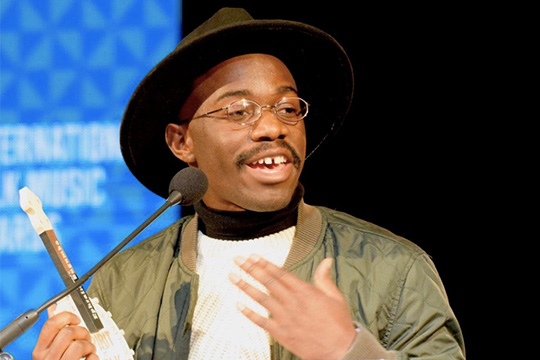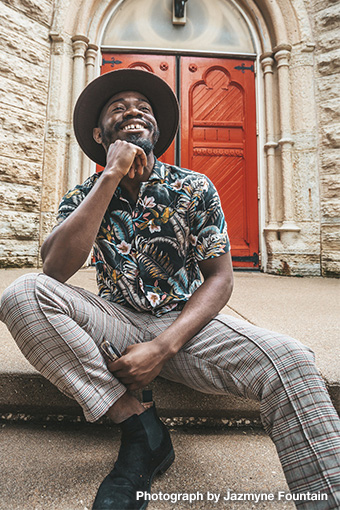Music is My Hope for Life.
(Part 2)
Ephraim Bugumba / Singer and songwriter
I Want to Share the Power of Music Back in My Home Country.
Having to flee their native village in the Democratic Republic of the Congo, Ephraim Bugumba and his family arrived in the Unites States after more than a decade of wandering as refugees. Ephraim’s efforts to become a musician bore fruit with his success on American Idol. As he builds his career as a singer and songwriter, he defines himself as a storyteller.
His experiences in early life explain the remarkable depth of his determination.
My songs represent my life through lyrics and melodies.
I call myself a storyteller and sing about my life as a refugee for a reason. The experiences I have lived through are relevant to all refugees and relate to the stories of many people’s lives. My song “Voice in My Head” candidly recounts the dilemma that weighed upon me when I chose to leave university to become a musician. When my friends from church first listened to the song, they told me they could relate to the story it tells. National Public Radio selected “Voice in My Head” as an entry in their Tiny Desk Contest in 2019. The responses from listeners were overwhelming.
The reception of “Voice in My Head” confirmed my belief that I can reach many people by telling my stories. A songwriter’s stories can be told in music alone, without lyrics. Chopin’s Nocturne No. 20 in C-sharp minor, Opus posthumous, expresses a dying man’s regrets in life and reminiscences of bygone happiness. The melody of a song has strong narrative qualities. In my own songs I strive for eloquence in the melodies as well as the lyrics.

I tell my stories to people to inspire them.
Recently I have had the opportunity to discover how stories can be told in ways other than music. In 2019 I took part in the International Folk Music Awards, a gathering of musicians and music specialists from across the world to celebrate folk music. There I joined a panel discussion as a winner of the Spirit of Folk Award, a category of award presented to artists actively involved in promoting and preserving folk music. The panel discussion was a wonderful opportunity to tell a large audience all about myself: about my earliest years in Congo, my experiences as an asylum seeker, my six years in the US, how music has been a crucial part of my life.
A Syrian woman in the audience stood up to share her own story. She had come to America as a refugee two years earlier, just like me. My story, she said, gave her the hope that she might one day achieve something in her life. My emotions welled up inside me as I listened. Everybody has something challenging, something difficult to deal with in their lives. I want to call out to them with my own life stories, to remind them that we are not alone in our struggles. I hope they can draw nourishment and find the courage and optimism to keep going.

My dream is to establish a music school for children in Congo.
When I first set out to be a professional musician, my idea of having a success was like winning a Grammy Award and having my songs played on the radio.
My wife brought me back down to Earth. “The Grammys are fine,” she said, “but what happens after that?”
As I pondered her question, it dawned on me that true richness is intangible. Material wealth is merely pleasant. So the success I pursue today is happiness for myself, for my family, for everyone.
Congo is my native country, though physically I have lived apart from it since I was 3 years old. I have a dream of one day returning to Congo to build a music school. If not for music, I would not be here today. Music is a tool to express ourselves. Music strengthens our will to survive. I would love to share the wonders of music with the children of Congo. From my experience as a part-time teacher of music to children in the US, I know I can bring life to music in their hearts. Every child deserves to flourish. Through music, I can help to put them on the right path.

- Ephraim Bugumba / Singer and songwriter
- Born in 1996, Ephraim Bugumba spent the first three years of his life in the Democratic Republic of the Congo. In 1999, his family was forced to flee from their home in the village of Makobola to escape a historic massacre. For the next 14 years, Ephraim and his family moved from one refugee camp to another in southern Africa. In 2012, he and his family moved to the United States, and now they are permanent residents. Six years later, he finished as one of the Top 50 contestants of Season 16 of American Idol (2018). His original song, “Voices in My Head,” was widely acclaimed in NPR’s Tiny Desk Contest in 2019. Not long after, he won a Spirit of Folk Award at the 2019 International Folk Music Awards. Ephraim made his professional debut in the same year with his single, “Class Clown.” His latest album, “Stormz,” was released in June 2020.
Interview Date:



